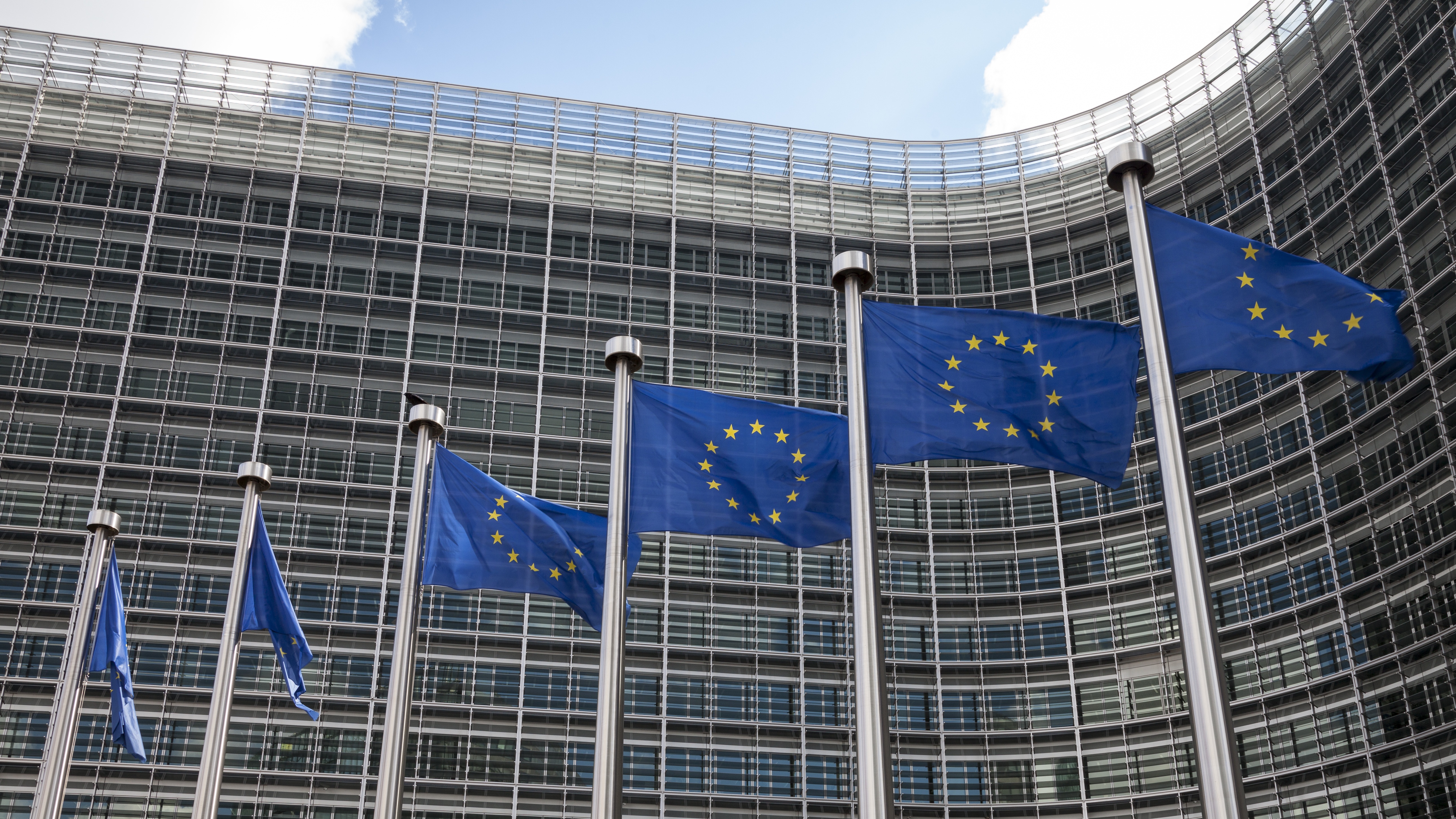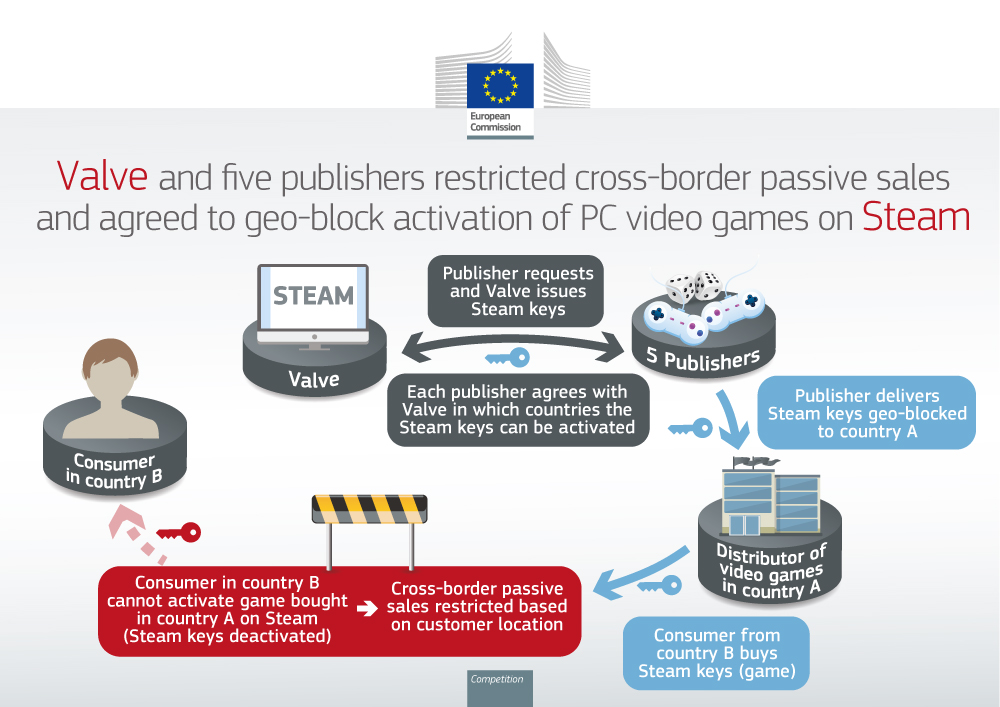EU court rejects Valve appeal against €1.6 million fine for 'geo-blocking' Steam games, says policy existed to protect publisher royalties and 'the margins earned by Valve'
The court likewise had no time for Valve's insistence that geo-blocking was pro-competitive, actually.

The Court of Justice of the European Union has dismissed an attempt by Valve to convince it that the geo-blocking of Steam game activation keys did not infringe on EU law, reaffirming its finding from 2021 that "Valve and five PC videogames publishers unlawfully restricted cross-border sales of certain PC videogames that are compatible with that platform".
In a ruling released on September 27, the General Court restated its 2021 judgement that Valve, alongside Bandai Namco, Capcom, Focus Home, Koch Media, and Zenimax had "participated in a group of anti-competitive agreements or concerted practices which were intended to restrict cross-border sales of certain PC video games," by "putting in place territorial control functionalities during different periods between 2010 and 2015" which were used to "eliminate parallel imports of… videogames and protect the high royalty amounts collected by the publishers, or the margins earned by Valve."
If you're not up to date on Valve legal news, this is the latest step in a journey that began all the way back in 2017, when the European Commission announced a set of investigations into companies that it thought might be "breaking EU competition rules by unfairly restricting retail prices or by excluding customers from certain offers because of their nationality or location".
That last bit, about restricting or excluding customers from certain offers based on nationality or location, is what the EU means by "geo-blocking". The countries of the European Union are meant to operate in one big, porous Single Market, meaning policies on the part of merchants that create unequal access to products across its member states are generally a big no-no. For example, you're not meant to prevent a Steam user in Romania from making use of a Steam key they purchased in France, or vice versa.

Problem is, prior to 2015, Steam very much did allow that, and publishers were able to set policies that prevented keys from certain member states from being activated in others, usually to prevent players from taking advantage of low prices in one corner of the EU in order to duck relatively high ones in their home countries, a process known as price arbitrage.
Since the EU announced its investigation in 2017, things have looked pretty bleak for Valve and the five publishers in the dock alongside it. In 2019, the EU sent official "Statements of Objections" to Valve and the five companies, calling them out on their geo-blocking practices (Valve said that holding a platform holder—itself—liable in such circumstances rather than just the publishers was "not supported by applicable law"). Then, in 2021, it handed down €7.8 million in fines to the accused companies, ranging from a mere €340,000 for Bandai Namco to a wince-inducing €2.88 million for Focus Home. Valve, accused by the Commission of not cooperating with it (a claim Valve denies), was fined €1.6 million, which it appealed.
That brings us to today, and the EU's rejection of that appeal. Valve had attempted to get the court's decision annulled on the basis that Steam only provided publishers with specific technical functions at their request and didn't demonstrate any "concurrence of wills to engage in specific conduct on the market."
The biggest gaming news, reviews and hardware deals
Keep up to date with the most important stories and the best deals, as picked by the PC Gamer team.
In other words, it might have provided publishers with the ability to geo-block, but it had no intention of geo-blocking itself. Valve had no "common intention in relation to the publishers’ conduct on the market and their decisions as to the use of keys". Valve also argued that the court had misapplied case law in its investigation and overlooked key facts.
Unluckily for Valve, none of those arguments held water. The court found that the investigation had "established to the requisite legal standard the existence of an agreement or concerted practice between Valve and each of the five publishers having as its object the restriction of parallel imports through geo-blocking of keys enabling activation," and that geo-blocking had been used to "prevent the videogames, distributed in certain countries at low prices, from being purchased by distributors or users located in other countries where prices are much higher."
The court went a step further in its response to Valve's appeal, ruling that, yeah, copyright is meant to protect the rights of holders to control and make money from their work, but it's not meant to guarantee "the highest possible remuneration" at all times.
The court also dismissed, with the textual equivalent of an airy wave of its hand, Valve's arguments that the pre-2015 geo-blocking had actually been pro-competitive (part of Valve's argument was that the end of geo-blocking would mean publishers hiking up prices in poorer regions). The court declared in its final paragraph that Valve had failed "to cast doubt" on the previous ruling "by referring to the alleged pro-competitive effects of the geo-blocking at issue."
So it's looking pretty likely Valve will have to pay that fine, which I can't imagine is even an amount it would notice missing from its bank account. I've reached out to Valve for comment on this story, and I'll update if I hear back.

One of Josh's first memories is of playing Quake 2 on the family computer when he was much too young to be doing that, and he's been irreparably game-brained ever since. His writing has been featured in Vice, Fanbyte, and the Financial Times. He'll play pretty much anything, and has written far too much on everything from visual novels to Assassin's Creed. His most profound loves are for CRPGs, immersive sims, and any game whose ambition outstrips its budget. He thinks you're all far too mean about Deus Ex: Invisible War.

